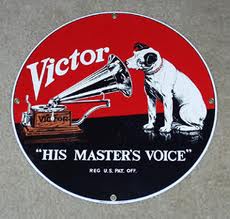
RCA is an electronics company likely unknown to people in their 40’s and younger. What you may remember seeing, though, is the iconic symbol of a white, short-haired dog staring into the large bell of an early phonograph, the company symbol of RCA Victor for many years.

The dog (“Nipper”) is captivated by the sound he hears coming from this contraption, the sound of “his master’s voice,” words trademarked by the company.
As I write, today is Ash Wednesday, beginning a season in which many in the church focus on what our Lord Jesus did–for the Father, for the world, for us–leading to His betrayal, trial and crucifixion, followed by the victory of His resurrection. This season becomes a time to focus anew on listening to our Master’s voice through His word in our personal times of reading, our times of silence, our times of corporate worship, our times of interacting together in serving and sharing the good news.
Hearing my Master’s voice implies I know it when I hear it. There are times when I clearly hear . . . and times when I have “beans in my ears.” I’ve witnessed children and those often ignored by leaders as unsophisticated, uneducated or uninformed hearing quite clearly, while those of us who should be aware seem not able to hear.
We shouldn’t be surprised by this, as it is a common theme with multiple examples throughout the Bible. Jesus, in declaring Himself the Good Shepherd, says this, But he who enters by the door is the shepherd of the sheep. To him the gatekeeper opens. The sheep hear his voice and he calls his own sheep by name and leads them out. When he has brought out all his own, he goes before them, and the sheep follow him, for they know his voice. A stranger they will not follow, but they will flee from him, for they do not know the voice of strangers.” John 10:2-5
Jesus’ claim, “I am the good shepherd,” is at once profound, prophetic and provocative. When He makes this bold statement, Jesus’ hearers would have instinctively called to mind not only Psalm 23, but also Jeremiah 23 and Ezekiel 34. John 10 then provides context for other New Testament passages on shepherds, including Paul’s counsel to the Ephesian elders in Acts 20 and Peter’s own understanding in 1 Peter 5, decades after Jesus’ restorative command to him in John 21.
How do I regularly cultivate listening for my Master’s voice? The more my spiritual ears become attuned, the more natural it will be for me to hear. That takes intentional practice. In short, I learn to listen.
Which begs the question. What are those regular practices in my life (daily, weekly, monthly, etc.) that help me listen? How am I modeling to others my listening to the Master?

As Regional Minister one thing I notice is the frustration of some leaders that the “sheep” aren’t following them. Sometimes it is due to stubbornness on the part of those we lead, a sheep issue. But the-sheep-not-following may also be due in part to our leadership, a shepherd issue.
Sheep won’t follow the voice of a stranger, says Jesus. They learn to trust one they know will care for them, who has the best interests of His sheep in mind. Trust is earned through crises and experiences . . . and time. We steadily, faithfully point others to the Good Shepherd and His words.
Are we leading or driving His sheep? Are the sheep learning to notice not just our voice, but the Master’s voice? How are we leaders modeling listening to His sheep so that we become better attuned together to the voice of the Chief Shepherd?
Take a moment to list the voices that you regularly hear each day. Do some of those “voices” hinder you from listening to the Master? Which ones could you silence, ignore or set aside during the next few weeks? May these days leading to Resurrection Sunday be opportunities to grow in the grace of listening together to and for our Master’s voice.
Randy Jaspers
Northern Plains Regional Minister
